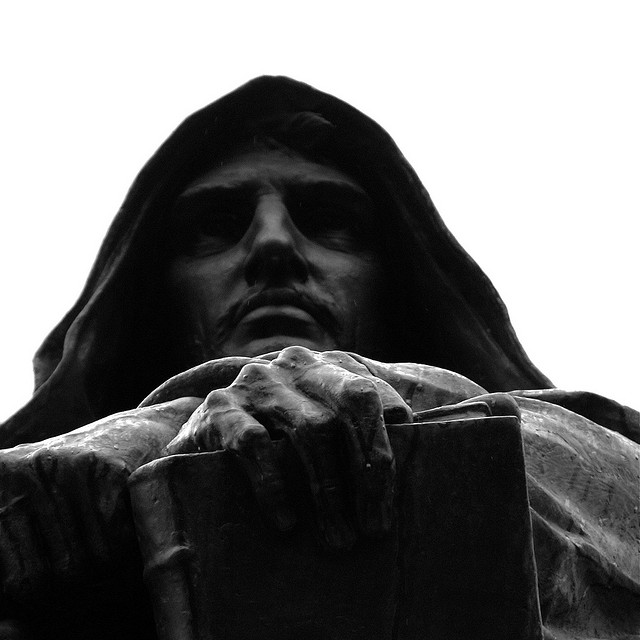Each week in “Walking with the Dead,” David Dunham reflects on the latest episode of AMC’s The Walking Dead.
“Don’t doubt in the darkness what you know to be true in the light.”
It’s one of those Christian clichés that has managed to make an impression on me. Perhaps it resonates with me because it recognizes the tension that so many of us experience between doubt and faith. It’s the same tension that many of the characters from The Walking Dead are experiencing in the second half of season four.
Every character in episode ten has to wrestle with their own doubts, it seems. They, of course, have every reason to doubt. The group is dispersed, they have no idea who is still alive, and they have lost nearly everything dear to them. Yet, for all the ominous signs, Herschel’s words of hope permeate every storyline. Beth reminds us of them at the outset of the episode. A voice-over from one of her prior journal entries quotes Herschel as saying, “If you don’t have hope what’s the point of living.”
Though Beth has lost nearly everything she is a persistent optimist throughout the episode. When she and Daryl come upon some footprints she is convinced it’s a sign that others are still alive. Daryl points out that it only means they were alive four or five hours ago. But Beth insists, “They’re alive!” “It wouldn’t hurt you to have a little faith,” she says.
But Daryl is still stuck in doubt: “Faith ain’t done sh*t for us. It sure as hell didn’t do anything for your father,” he retorts. Beth will have to believe for both of them. Those things she wrote in her journal with such confidence fuel her forward even now, “We’re not gonna die. I believe now, I believe for daddy,” she wrote. In one scene she is literally tearing pages from her journal to feed their camp fire, a bit of heavy-handed symbol, but effective: Beth’s persistent faith will keep them going.
Maggie too experiences this tension between faith and doubt in the aftermath of the dispersion. For her the question of Glen’s survival remains unanswered. She must know and she refuses to rest until she knows. At times she is confident that he has made it. She tells Sasha and Bill, “I know Glen got out and I know which way he was going.” But then when she finds the bus she’s not sure; she has to go through the zombie faces on the bus one-by-one to confirm that Glen isn’t among them. Bill aims to support her faith. After all, in the zombie apocalypse if you don’t have faith what do you have. “Not everything means something,” Sasha says. Their survival doesn’t necessarily mean anything in the grand scheme of the universe. She’s right of course, but there’s another way to look at it. While she doubts, Bill chooses to believe. “It doesn’t have to [mean something] but it can, if you let it,” he says, “And that seems like what we’re doing. I am okay with that.” He chooses faith.
Like Maggie, Glen must find the same persistent faith to believe that the others alive. Glen wakes up to a hoard of clamoring zombies. He is still at the prison, having gotten off the bus before it left in order to search for Maggie. He has only a moment of breakdown, but he wills himself to his feet, grabs the pocket watch Herschel entrusted to him, and prepares to go search for his wife. Tara asks him, “How do you know she made it?” Again Herschel’s faith inspires: “I don’t,” he responds, “But Herschel, Maggie’s dad, said all I have to do is believe. That’s what I am going to do.” Even in the darkest moment he believes. He has no other choice but to believe. “Things aren’t over,” he tells Tara, but she can’t believe him. “I want to believe,” she says, but she can’t. She doubts while Glen chooses to believe. But Glen is not really believing on his own. Neither is Maggie, nor Beth. All three are living off of borrowed faith: Herschel’s faith.
Faith is not easy. There are plenty of times where we, like the Psalmist in Psalm 22, bounce back and forth between belief and doubt (note the use of “yet” in this chapter). We often struggle to believe and find ourselves more inclined to pray like the man of Mark 9:24, “I believe, help my unbelief.” In the face of such doubt and struggle the community of believers is essential to us. Sometimes I need to rely on the faith of others. Of course I have to eventually acquire my own faith for it to make a long-term difference, but relying on the faith of others can be a means to getting me there. Such “borrowed faith” was particularly important to me in the aftermath of my father’s death.
I recall how after his death I struggled to believe in God’s goodness. I struggled to believe that things were going to be okay. Like the main characters of The Walking Dead, I wanted to believe it was going to be okay, but the strength to believe it myself just wasn’t present. But when I witnessed the lives of friends who had suffered similar loss (the couple who lost their son, the wife who lost her husband, the single mom who lost her teenage boy), and when I witnessed the faith they had in God’s goodness I was able to believe. Even while I might not have been able to personally claim that knowledge, I believed because of them. I believed through them. Eventually I would experience that reality myself, but their faith was important in my season of doubt.
Glen, Maggie, and Beth don’t believe – not really. But they believe because of Herschel. His faith gives them hope, propels them forward. Sometimes you have to live on borrowed faith, especially in the zombie apocalypse.











